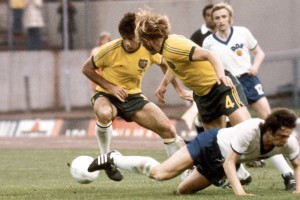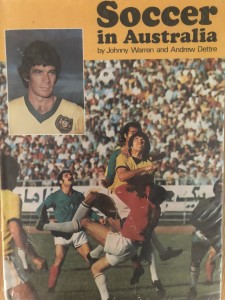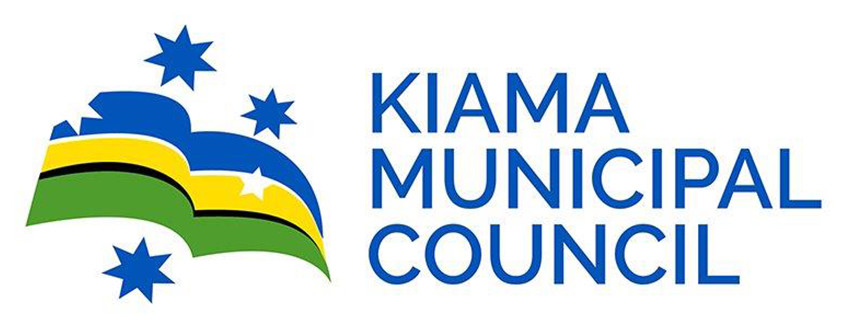Today marks the 14th anniversary of the passing of Johnny Warren MBE OAM FIFA Centennial Order of Merit.
In 1974, the year of Australia’s first appearance in the FIFA World Cup, Johnny Warren and renowned Australian football journalist Andrew Dettre wrote a book titled ‘SOCCER in Australia’. To mark the anniversary of Johnny Warren’s passing and to recognise the pioneering efforts of both Johnny and Andrew, we are reproducing the introduction to the book and Johnny Warren’s auto-biographical introduction ‘Soccer is my life’, which we hope you will enjoy!
SOCCER in Australia, by Johnny Warren & Andrew Dettre
Johnny Warren, former captain of the Australian team, retired from active playing at the end of 1974. At present he is manager-coach of Canberra City, one of the clubs in the new Philips Soccer League of Australia. In 1973, he received an MBE for his services to sport. Over the years he has been writing for a Sydney Newspaper and providing commentary on radio and TV.
Andrew Dettre has been a journalist and sports writer for more than 20 years. He is editor of the weekly newspaper Soccer World and is a regular contributor to many of the world’s greatest sporting publications, including L’Equipe and France Football (Paris), Kicker (Nurnberg), World Soccer and Shoot (London).
Introduction
From the outset, we were hoping to produce a soccer book rather different from almost and other available in this country. Australian Soccer demanded a fresh approach and a new set of values.
Australia is not yet a ‘soccer country’ and the games traditions, appeal and grassroots are somewhat limited. Despite its presence over almost a whole century, soccer in Australia has not attained the degree of glamor and public acceptance that are its natural by-products all over Europe and Latin America, even Africa and a large part of Asia.
In Europe and South America, for example, children grow up on soccer without any other football code diverting their attention. In Australia, soccer must learn to live with Rugby League, Rugby Union and Australian Rules as its competitors.
It was largely for these reasons that we resisted the temptation of producing yet another coaching manual and set out instead, to present a more comprehensive picture of what soccer is all about. This approach, we will be appreciated not only by the young readers of this book but also to their families who may be late-comers to this fascinating game.
We lay no claim to this book being a soccer ‘bible;’ dealing with such a great variety of subjects almost automatically precludes the possibility of completeness. We prefer to believe that this could be an everyman’s book on soccer, covering the entire spectrum from coaching and tactics through historical, refereeing and medical aspects right down to the game’s international aspects.
We hope to educate, instruct and entertain at the same time those who are already in the magical grip of soccer. If, in the process, we manage to obtain a few converts from other codes of football, we will have done better than we had expected.
Johnny Warren & Andrew Dettre (1974)
Dedication
This book is dedicated to the man who invented the ball, undoubtedly the greatest and most pleasurable toy of mankind.
JW and AD
‘Soccer is my life’
Johnny Warren says:
You will probably be shocked to hear that I have never been properly coached in my early career. Like most other boys those days, I had to learn by trial and error, relying on observation and intuition rather than formal schooling.
Some of my first coaches may feel that I am being unfair to them but that’s not my intention. Take ‘Uncle’ Joe Vlasits, my first coach at Canterbury, a kindly, wonderful man who has always been a sort of father-figure to me. It was under him that I made Canterbury’s first team. Again, years later, Vlasits was the Australian team’s coach when I became its captain and when we won our first international tournament, in Saigon.
Vlasits always inspired me. I always wanted to play and win for him. The same way I owe a great deal to other coaches, like Laurie Hegyes, Frank Arok and Mike Johnson; from each of them I learned something new and different.
But I can only repeat that I was never formally taught all the skills of the game. Maybe they took this from me for granted. Perhaps they found it impossible to start teaching me these skills to each and every player under their care. I have always felt that my job was to help the team win matches and championships with whatever skill I had – but what I did have was never methodically improved.
Actually, it wasn’t until I went to Kuala Lumpur in Malaysia in 1972 for a FIFA coaching course that I realised just how much I didn’t know. It was only there that I saw, for the first time, the brilliant ex-FIFA coach Dettmar Cramer show and explain all the proper if not classical ways of kicking, heading, passing and trapping a ball. And all this after I turned 28, after two World Cup series, many international matches and even a brief spell in England.
I guess it’s fair to say that I have been infatuated with soccer ever since I was about five or so and this hasn’t changed over the years.
Soccer’s most obvious appeal all over the world is that it’s an easy game to watch, follow, understand and learn to play, as far as the rules are concerned. Soccer flows on without too many stoppages; continuity is built into the rules and spirit of the game.
It is also a ‘genetically democratic’ sport. You don’t have to be very big, tall or powerful to succeed. Soccer doesn’t differentiate on physical grounds; some of the world’s greatest players have been under 5ft 8in. It’s skill that counts. Speed, strength and stamina are all necessary attributes but not the determining ones.
The need for skill cannot be stressed often enough. Drawing on my own experience I feel that there is too much emphasis on winning matches at too early and age among juniors. They are pushed into fierce competitions too soon, long before they have had a chance to acquire the fundamental skills. The result is that they grow up, forged tough in this perennial competitive spirit, but fail to learn properly the finer points of soccer.
Ideally, boys should not play competitive soccer under the age of 10. Under 10, there should be only pickup and impromptu games, without too much organisation and formality – certainly without the pressure created by the need to win. But I realise this is now almost impossible. If soccer didn’t provide regular competition for boys under 10, they would go – or be dragged – to another code that offers such an outlet. This is the type of competitive country and world we live in.
So I would seek a solution somewhere else. With the financial aid of some business houses that have already shown a keen interest in soccer, I would recruit dozens of our most skilled retired players for a massive coaching campaign and spread them around the schools and junior associations of the entire metropolitan area.
I would ask former leading players to go and teach, skill by skill, our youngest, just what soccer is all about. Such a large-scale, well organised move would surely have good results over a few years.
If the very young – or their ambitious parents – cannot be dissuaded from plunging into the hurly-burly of competition, then at least those boys, some hardly able to walk, let alone kick in their shiny new boots, would stand a chance to learn the game’s basic skills from the real experts.
With this I am not trying to belittle the unselfish and at times marvellous work so many of our volunteer junior coaches are performing; however, they know as well as I do, that only a woefully small percentage of them are properly equipped to teach fine soccer.
I feel also that some changes in the rules could benefit our junior set-up. We should consider following the example of some European countries where sub-juniors wear tennis shoes, not soccer boots. These are more ideal to acquire that all-important, elusive ‘ball sense’. Smaller grounds (or grounds across the pitch) and smaller goals would also be helpful. Let’s treat children as children – and not as young adults.
The whole atmosphere of soccer in Australia is rapidly changing. Young boys today are incomparably more knowledgeable about the game than we were. No doubt television has a lot to do with this.
As a youngster, I never really had an idol – a player whose style or career I would have wanted to follow. The rest of the world for us was merely differently colored spots on the map. However, the closest that came to an idol for me in later years, was Bobby Charlton, the great Manchester United and England player, a thorough gentleman, a wonderful performer and soccer’s great ambassador who was genuinely respected on and off the field.
I have been asked in the past which local player I regarded as the ‘best’ during my career and I invariably declined to name one. I have always admired various players for various skills; like my good friends Manfred Schaefer and Atti Abonyi. Schaefer’s incredible competitiveness and Abonyi’s pure, elegant skill are both world class qualities. Combine those into one player – and you will have a Franz Beckenbauer.
However, the player I regard as the greatest all-rounder in Australia is Johnny Watkiss. He was superb as a dynamic midfield man; a prolific scorer as a striker, and later a tremendously intelligent defender.
I may be biassed, as John and I have been friends for more than 20 years; played together as teenagers, then at Canterbury, later in the Australian teams. I still remember when he arrived with his parents from England. They lived some 50 yards down the street from us and it took me no time at all to find out about this well-built English kis, hopelessly soccer daft.
He came to Australia fully indoctrinated about soccer, bringing with him dozens of soccer books, magazines, color cards and other memorabilia. Our friendship was struck at once and has lasted more than two decades.
John, still a brilliant player, is now approaching the veteran stage – and I’ll soon follow him. I’ll be 31 this year and look forward to the World Cup finals in West Germany as the culmination of my career. After the World Cup, I hope to continue for a few more years before I retire. But I’ll stay in the game. Soccer has become my life.
At times I feel that fate has assigned some form of tough, often cruel yet never dull pioneering role for me. I can honestly say I never sought it but my own involvement, perhaps curiosity and ambition, have enabled me to break down some barriers, to chalk up some ‘firsts’ in Soccer.
At 16 I was playing in the First Division; at 24 I was captain of Australia, leading our team to our first major international success at Saigon. I was lucky enough to be with my club, St George Budapest, as the first Australian team to tour Japan. I was the first active player to finish a FIFA coaching course. A regular TV show and newspaper column over the last few years have been other ‘barriers’ cleared.
I am not heroic about all this. They all had to be done and I was fortunate enough to be there to do them. Even this book, the first by an active player in this country, follows the same pattern. I would like to feel that in some small way I have managed to contribute to soccer’s general acceptance in our community. I hope that I have put at least as much back into the game as I have got out of it.
Because I really believe in the game’s future in Australia, I can see no reason why soccer, the most popular and universal sport in the world, as far as participants and spectators go, shouldn’t at last become our national game. I am equally convinced that our standards will keep rising and international results will keep improving.
The depositories of our future are today’s kids. They will have to carry on, hopefully on a higher plane, the work our predecessors and we have put into it.
Johnny Warren – 1974
Rest in peace Johnny – you told us so!

Bildnummer: 00450547 Datum: 14.06.1974 Copyright: imago/Frinke
V. li.: John Warren, Manfred Schäfer (beide Australien) und Jürgen Sparwasser (DDR); Schafer, Schaefer, Nationaltrikot, Vdia, quer, Zweikampf, Duell, Ball Weltmeisterschaft 1974, Länderspiel, DDR – Australien 2:0, Nationalmannschaft, Nationalteam Hamburg Volksparkstadion Dynamik, Fußball WM Herren Mannschaft Deutschland Gruppenbild Aktion Personen




